Salute to Seniors | Class of 2022
Meet 38 of the many graduating seniors who focused deeply on both Liberal Arts and STEM fields at MIT. In their own words, these "bilingual" students reflect on the value of their multi-dimensional, dual-competence MIT education — and their visions for the future!
Click on a student's name for a full profile.
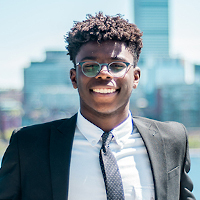 |
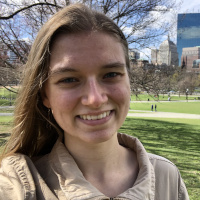 |
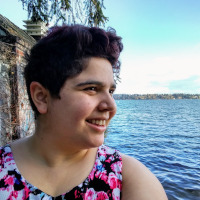 |
|
Dolapo Adedokun |
Anna B. Aldins |
Andrea Arias |
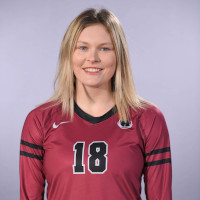 |
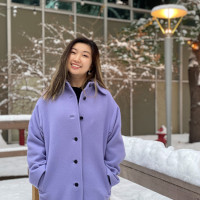 |
 |
|
Majors: Computer Science + Mathematical Economics |
Majors: Computer Science + Music |
Major: Nanoengineering |
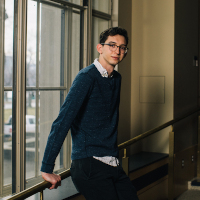 |
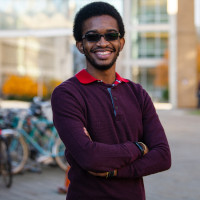 |
|
|
Major: Physics
|
Major: Mathematics |
Majors: Biological Engineering; Biology |
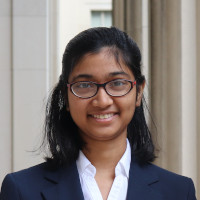 |
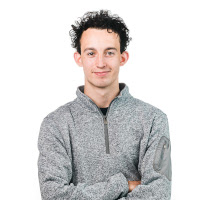 |
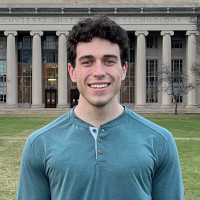 |
|
Majors: Linguistics; Philosophy; Computer Science
|
Major: Electrical Engineering and Computer Science |
Majors: Computer Science, Economics, and Data Science; Literature |
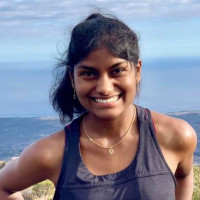 |
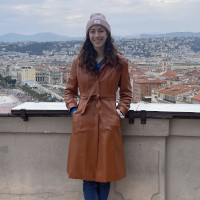 |
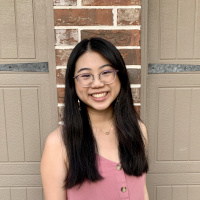 |
|
Major: Computer Science, Economics, and Data Science |
Majors: Biology; Women's & Gender Studies |
Hannah Liu |
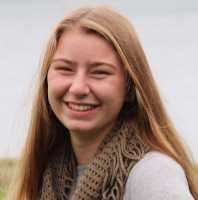 |
||
|
Majors: Materials Science; Engineering with Computer Science |
Major: Mathematical Econ |
Amelia Meles
|
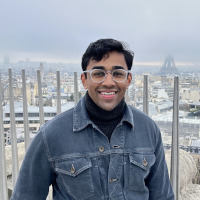 |
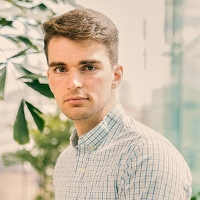 |
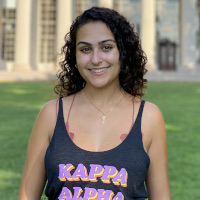 |
|
Rajiv Movva |
Majors: Computation and Cognition; Linguistics; Philosophy |
Major: Biological Engineering |
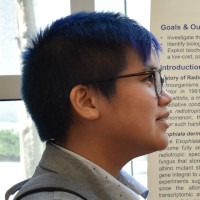 |
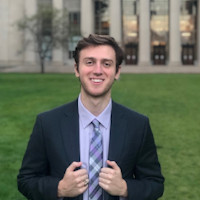 |
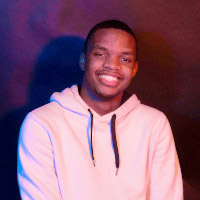 |
|
Majors: Chemical Engineering; Literature |
Thomas Ogeka |
Major: Mechanical Engineering |
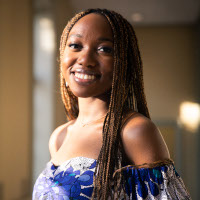 |
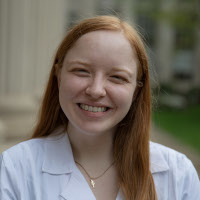 |
|
|
Sharon Chidinma Opara-Ndudu
|
Syamantak Payra |
Lauren Platt |
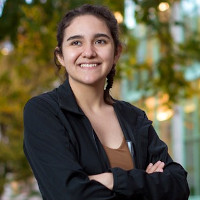 |
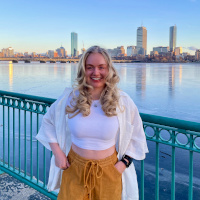 |
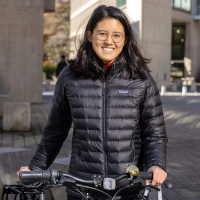 |
|
Majors: Math + Philosophy |
Majors: Computer Science and Engineering; Math |
Laura Rosado |
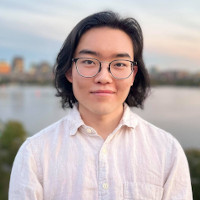 |
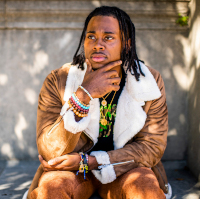 |
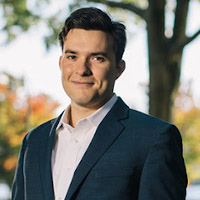 |
|
Edwin Song |
Major: Bioengineering |
Major: Computer Science and Electrical Engineering |
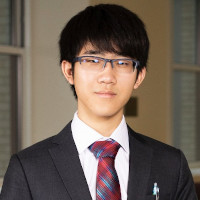 |
||
|
Majors: Computer Science and |
Majors: Computer Science, Economics, and Data Science; Business Analytics |
Major: Biological Engineering |
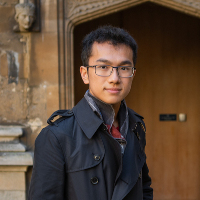 |
||
|
Majors: Computer Science; Political Science |
Majors: Physics; Electrical Engineering and Computer Science |
|
Full Profiles | Salute to Seniors 2022
"Dual competence is a good model for undergraduates at MIT: master two fundamental ways of thinking about the world, one technical and one humanistic or social."
— Professor David Mindell, Historian, Engineer, Co-founder and CEO of Humatics Corporation
 |
|
Anna B. Aldins
Major: Music
Minors: Ancient and Medieval Studies; Mathematics
Hometown: Boston, MA
Vision: PhD program in Music History at Yale University
What have you most enjoyed about studying music and AMS?
The wide range of interests in both the music and AMS communities at MIT continues to astound me, four years later! I've been lucky enough to study jazz history with a professor who played alongside Duke Ellington, to research under the head of Digital Humanities at MIT, to travel across Greece with a historian of the ancient Mediterranean, to learn about computational music theory from the professor who wrote the main program used in the field, to drum with master griots on a Senegalese beach, and much more, all with fellow students whose interests and work are just as incredible.
How does the knowledge from music and AMS, or your interest in them, combine with your other studies at MIT?
At MIT, being introduced to Digital Humanities research has had a major impact on how I think and approach research. With those skills, I get to apply mathematics and computational concepts to ancient sources, in order to try to understand music in a new way.
An MIT education includes study in the scientific, technical, social science, arts, and humanities fields. How do you think that wide range of knowledge and perspectives will be valuable to you — for your career success and for your enjoyment of life?
As someone who studies ancient music through computational approaches, my time at MIT — my education overall, my life — would not be complete without HASS! Studying HASS alongside technical and scientific fields has given me the opportunity to hone my skills in each field individually and gain a better understanding of how to apply concepts across fields. As someone who is always curious, I think the interdisciplinarity that MIT encourages is incredibly fun too!
What are your plans for the future?
Come fall, I will be beginning the PhD program in Music History at Yale University!
 |
|
Andrea Arias
Major: Mathematics with Computer Science
Minor: Women's and Gender Studies
Hometown: Denver, CO
Vision: Working at Google as a Software Engineer
What have you most enjoyed about studying Women's and Gender Studies (WGS)?
I really enjoyed how interdisciplinary WGS is as a subject. My courses have varied widely in topic as well as in material, but they’ve all helped me understand the world. Science Activism, a course cross-listed with STS (Science, Technology, and Society), really dug into activist movements in science as well as larger topics around how we see science and its claim to “objectivity.” Another WGS course I really loved was Women and Gender in the Middle East and North Africa. It was the first time I really learned about orientalism and the impacts of colonialism in the Middle East, and it has profoundly shaped my understanding.
How does the knowledge from WGS, or your interest in it, combine with your other major or minor studies at MIT?
I have taken at least two WGS classes cross-listed in STS that intersect more directly with computing and science, topics more related to my primary major, math with computer science. Cultures of Computing touched on many of the ethical problems in computer science that are imperative for software engineers to understand.
An MIT education includes study in the scientific, technical, social science, arts, and humanities fields. How do you think that wide range of knowledge and perspectives will be valuable to you — for your career success and for your enjoyment of life?
I have enjoyed my humanities classes at MIT tremendously. They have been some of my favorite classes, both the ones that are directly applicable to ethical implications in my life working in software, as well as those that aren’t but teach me subject matter that is just generally important to understand the world.
What are your plans for the future?
Next year I will be working at Google as a Software Engineer here in Kendall, and I hope to one day combine my passion for tech with social good.
 |
|
Annie Bryan
Majors: Computer Science; Mathematical Economics
Concentration: Spanish
Hometown: Kirkwood, Missouri
Vision: Software Engineer for Meta; exploring a PhD or Master’s in Economics or Computer Science.
What have you most enjoyed about studying Spanish?
Throughout my time at MIT, I’ve developed more nuanced ways of thinking, problem-solving, and communicating. I’m able to approach challenges more analytically and creatively. My favorite challenge has been the semester-long research project from 14.33, in which I applied empirical methods to datasets from government agencies.
How does the knowledge from Spanish, or your interest in it, combine with your other major or minor studies at MIT?
During IAP 2022, I taught introductory Python to high school and college students in Santiago, Chile. I used programming knowledge from my Computer Science major to develop and teach the content. I would not have been able to do this without the skills and confidence I gained from my Spanish classes at MIT.
An MIT education includes study in the scientific, technical, social science, arts, and humanities fields. How do you think that wide range of knowledge and perspectives will be valuable to you — for your career success and for your enjoyment of life?
From my experiences abroad in Spain and Chile to my UROPs and every pset along the way, my four years at MIT have been more rewarding than I ever expected. Every facet of my MIT education has helped transform me into a more curious and collaborative learner, as I find myself asking the “how” and “why” questions in my everyday life.
What are your plans for the future?
This summer, I will travel to Denmark, where I’m going to intern at Muninn, a cybersecurity startup. In September, I will start a position as a Software Engineer for Meta at their Boston office. Down the road, I’m interested in exploring a PhD or Master’s in Economics or Computer Science.
 |
|
Claire Cheng
Majors: Computer Science; Music
Hometown: Fremont, CA
Vision: Working in NYC at Facebook
What have you most enjoyed about studying music?
I have enjoyed the performance opportunities the most; I love the performing arts, and being able to do both group and solo recitals and concerts at MIT was a really rewarding experience. I also liked taking cool music classes since the instructors were always really supportive and fun to learn from! One of my favorite classes was Animated Film Music, a half-semester sampler class taught by Professor Marks during my sophomore fall. I’ve always been a huge fan of Studio Ghibli music, so it was super exciting to actually be able to write about it in a class.
I also really enjoyed Interactive Music Systems taught by Professor Egozy during my junior year fall term, and I made projects that I was actually proud to show to my friends. Before college, I was mostly only familiar with the Western classical sphere, and taking music classes at MIT definitely broadened my knowledge of music. From learning about Medieval and Renaissance music to playing Brazilian samba in the World Music Room, as a musician I’ve grown far beyond what I could ever have imagined.
How does the knowledge from music, or your interest in it, combine with your other major or minor studies at MIT?
Music and technology have a lot of intersections, some of which have been explored already and many which have yet to be explored. I’m excited to discover more of these intersections.
An MIT education includes study in the scientific, technical, social science, arts, and humanities fields. How do you think that wide range of knowledge and perspectives will be valuable to you — for your career success and for your enjoyment of life?
The breadth of knowledge and varied perspectives have definitely made me see the world in different ways, sometimes more pessimistically and sometimes more optimistically. It’s always a double-edged sword, but I think that as cliche as it is, the more you know, the more you realize you don’t know, and for me, that means the more that I am motivated to learn. Which is a good thing, I think!
What are your plans for the future?
I will be working in New York City at Facebook!
 |
|
Sammi Cheung
Major: Nanoengineering
Minor: Women's and Gender Studies
Hometown: Sudbury, MA
Vision: Planning on a PhD in Mechanical Engineering, studying nanotechnology
What have you most enjoyed about studying Women's and Gender Studies (WGS)?
My WGS classes helped me break down my previous assumptions about social categories such as race, gender, class, and sexuality. In learning how these categories were constructed, I learned to rebuild my own ways of thinking. I especially enjoyed my final project for WGS.301, Feminist Thought, in which I studied the unique burdens that COVID and gentrification pressures placed on low-income Chinatown residents across the US.
How does the knowledge from this field, or your interest in it, combine with your other major or minor studies at MIT?
I’ve learned to think critically and creatively about both literature and academic papers through WGS classes, which has helped me immensely when developing my research. As a mechanical engineering major on the nanoengineering track, I also greatly value the societal impact of the technology I develop.
An MIT education includes study in the scientific, technical, social science, arts, and humanities fields. How do you think that wide range of knowledge and perspectives will be valuable to you — for your career success and for your enjoyment of life?
Studying at MIT helped me discover my interests in so many different fields and taught me how to pursue those interests in the future. Nothing happens in a vacuum: every field is impacted by and impacts other areas, and thinking about the intersections between all the issues that I’m passionate about will help me create meaningful change in my work within and outside of my career.
What are your plans for the future?
I’m planning to do my PhD in Mechanical Engineering, studying nanotechnology.
|
|
Kylie Yui Dan
Major: Physics
Minors: Astronomy; Japanese
Hometown: Twin Falls, ID
Vision: Going to Japan to conduct Astrophysics research as a Fulbright Fellow; PhD in Astronomy
What have you most enjoyed about studying Japanese?
As a half-Japanese person, learning Japanese has allowed me to communicate with half of my family, which I was never able to growing up. It has also helped connect me with my heritage and culture in a more meaningful way.
How does the knowledge from this field, or your interest in it, combine with your other major or minor studies at MIT?
Studying Japanese has allowed me to apply for and become a Fulbright Japan finalist. I was able to connect with an Astronomy professor in Japan using my Japanese skills and propose a research project with her.
An MIT education includes study in the scientific, technical, social science, arts, and humanities fields. How do you think that wide range of knowledge and perspectives will be valuable to you — for your career success and for your enjoyment of life?
One of my favorite classes I've taken in my MIT career was a class on 21st century physics history. It put into perspective how science, society, and politics are interconnected, something I had never realized before. As a person who is planning to go into academia, it was really valuable for me to learn about how science is reliant on and shapes society and is not simply isolated from it.
What are your plans for the future?
I will be going to Japan this fall to conduct Astrophysics research with Prof. Hanae Inami as a Fulbright Fellow. Next year, I will hopefully begin my PhD in Astronomy at University of Maryland, College Park.
 |
|
David Darrow
Major: Mathematics
Minor: German
Hometown: Wallingford, CT
Vision: Churchill Scholarship to study for MPhil at Cambridge; then, pursuing a PhD in mathematics at Princeton
Feature Story
What have you most enjoyed about studying German?
Over the past four years, German has transformed from an academic pursuit to a major part of my life; it’s the first foreign language I’ve felt truly comfortable reading, speaking, and thinking in, and the transition to two languages from one feels like it opens entirely new ways of thinking. Now, I also find German in particular to be a really cool language and culture, and I think some of my favorite examples of this are from science. A turtle in German is a Schildkröte – a “shield toad,” and hydrogen is Wasserstoff – “water stuff.” The modern German scientific lingo reflects the nation’s different modes of thinking, as well as the deep interplay of science and practical engineering in German history, and I think that “shield toad” is a brilliant insight into the base components of a turtle.
How does the knowledge from this field, or your interest in it, combine with your other major or minor studies at MIT?
German (as well as the other languages I’ve studied with MIT Global Languages!) has been incredibly helpful for me in better understanding and communicating in mathematics. A great deal of our current math and physics was pioneered in Weimar Germany, and so — even though the centers of these subjects moved around quite a bit prior to World War II — a lot of historic and modern resources for these subjects are best found in German. In fact, even this past week, I had to consult a German article for a project my students are performing in MIT PRIMES.
An MIT education includes study in the scientific, technical, social science, arts, and humanities fields. How do you think that wide range of knowledge and perspectives will be valuable to you — for your career success and for your enjoyment of life?
I think that the broad education that MIT, and in particular MIT SHASS and Global Languages, has already made a large difference in my career and life. Even within my math research and learning, German, French, and Russian resources provide three very different perspectives through three very different traditions. More than just differences (which certainly exist!) in the presentation of theorems or in mathematical notation, these cultures place emphasis on different parts of the field: the use of examples and applications in presenting research, the level of mathematical rigor in teaching the material, and even the sorts of problems historically studied vary tremendously between these cultures (as well as our own). Of course, the most important things my language studies have given me have nothing to do with math: a greater understanding of global problems through different lenses; a better sense of the history, culture, and society of each of these nations; and fundamentally, a way to communicate with many more people more effectively than I could before coming to MIT.
What are your plans for the future?
I am fortunate to have been granted a Churchill Scholarship to study next year for an MPhil at Cambridge, where I’ll be working on problems relating to stochastic (randomized) algorithms for ocean modeling alongside Professor Colm-Cille Caulfield. After that, I’ll be pursuing my PhD in mathematics at Princeton, where I’ll be researching fluid dynamics under the supervision of Professor Peter Constantin. After that, I hope to continue pushing forward in math! I’m very interested in fluid dynamics, and in particular problems related to climate change and to nuclear fusion.
 |
|
Desmond Edwards
Majors: Biological Engineering; Biology
Minor: French
Hometown: St Mary, Jamaica
Vision: PhD in Microbiology and Immunology at Stanford
What have you most enjoyed about studying French?
I’ve loved not only improving my proficiency in French, but also getting to explore many different aspects of Francophone culture from many countries. It’s been particularly great getting to combine studying French with other areas, like politics and pop music. In that vein, a couple of my favourite classes have been French Pop Music, Understanding Contemporary French Politics, and A Tour of Belgium in 80 Days, but all my French classes have been absolutely brilliant!
How does the knowledge from this field, or your interest in it, combine with your other major or minor studies at MIT?
My French minor plays particularly well with my other majors of Biological Engineering and Biology. French is one of the key languages used in global health, and given my interest in infectious diseases, my French studies pair nicely.
An MIT education includes study in the scientific, technical, social science, arts, and humanities fields. How do you think that wide range of knowledge and perspectives will be valuable to you — for your career success and for your enjoyment of life?
David Hume said “Be a philosopher; but amidst all your philosophy, be still a man.” My version, however, is “Be a researcher; but amidst all your research, be still a person.” Though my academic interests lie primarily in the technical fields, I am personally also interested in languages, history, geopolitics, and international relations, inter alia. Having exposure to a wide range of disciplines not only makes for a more whole person but also leads to more creative thought, which will be instrumental as I work to leave lasting positive impacts for human health.
What are your plans for the future?
I’ll be pursuing a PhD in Microbiology and Immunology at Stanford as a Knight-Hennessy Scholar and an NSF GFRP Fellow. Long-term, I hope to have an academic career that blends biomedical research into human disease with public policy, outreach, and education.
 |
|
Shinjini Ghosh
Majors: Linguistics; Philosophy; Computer Science & Engineering
Minor: Math
Hometown: Kolkata, India
Vision: Pursuing an MEng at MIT; working in Prof. Jacob Andreas’ Language & Intelligence lab
What have you most enjoyed about studying linguistics?
I have loved studying the various little aspects of language — phonology, morphology, syntax, semantics, and pragmatics. I have also greatly enjoyed learning more about child language acquisition, bilingualism, as well as language variation and change. A particular insight I found valuable was from the book “The Last Speakers,” which I received in 24.900; it speaks about how language encodes so much of the knowledge the human race has discovered about the world, such as the names for medicinal herbs or types of rain, and how the preservation of near-extinct languages is crucial to preserve the knowledge discovered by a culture or a race over hundreds of years.
How does the knowledge from this field, or your interest in it, combine with your other major or minor studies at MIT?
I am extremely interested in working at the intersection of the trifecta of computer science, linguistics, and brain & cognitive sciences, to help get to a unified Holy Grail theory of human language acquisition and use that these fields can provide, and how we can leverage the same to build a true language model which can burgeon our technological advances.
An MIT education includes study in the scientific, technical, social science, arts, and humanities fields. How do you think that wide range of knowledge and perspectives will be valuable to you — for your career success and for your enjoyment of life?
My SHASS classes have been as, if not more, important to me as my classes in engineering and sciences. They have taught me the importance of communication and provided me with invaluable perspectives on society, particularly about the progression and use of language.
What are your plans for the future?
I will be pursuing an MEng at MIT next year and working at Prof. Jacob Andreas’ Language & Intelligence lab for a project on “Building a Neural Acquisition Model Utilizing Bidirectional Phrase Representations,” which would also help build upon my linguistics, CS, and cognitive sciences knowledge.
 |
|
Luka Govedič
Major: Electrical Engineering and Computer Science
Minors: Music; Physics
Hometown: Slovenska Bistrica
Vision: Pursuing a Master's in CS at MIT; software development or continuing a path in academia
What have you most enjoyed about studying music?
My favorite part about studying music is that it gave me a way to be creative. I was never good at drawing or other forms of art but always enjoyed being creative, whether through LEGOs or coding. Taking 21M.301 and subsequent music theory classes gave me the skills and more importantly confidence to pursue composition.
How does the knowledge from this field, or your interest in it, combine with your other major or minor studies at MIT?
While there are ways to connect music to physics through the study of vibrations and to computer science with music technology, I really enjoy music in isolation from my STEM interests. I like variety in life and music just fills a different part of my life.
An MIT education includes study in the scientific, technical, social science, arts, and humanities fields. How do you think that wide range of knowledge and perspectives will be valuable to you — for your career success and for your enjoyment of life?
It's really hard to quantify the benefits of my education at MIT. The classes I've taken, and the people I've met and worked with, they've all helped me grow and improve my skills in all areas of life. I've grown as a computer scientist, composer, athlete, and most of all as a person.
What are your plans for the future?
I'm going to stay at MIT for at least one year to pursue a Master's degree in CS. After that, I might go work as a software developer or continue my path in academia.
 |
|
Billy Jones
Majors: Computer Science, Economics, & Data Science; Literature
Minor: Business Analytics
Hometown: Brookfield, Massachusetts
Vision: Working as a management consultant for the Boston Consulting Group
What have you most enjoyed about studying literature?
My favorite part about studying literature has been the expansion of my consciousness. It was most salient while studying George Eliot’s Middlemarch because one’s capacity for empathy is a central focus of the novel. I also felt it while reading To the Lighthouse by Virginia Woolf because her ability to capture the human psyche in such beautiful prose will never cease to amaze me.
How does the knowledge from this field, or your interest in it, combine with your other major or minor studies at MIT?
Functional knowledge can be picked up and honed on the job, but my literature major allowed me to practice engaging in conversation with other smart individuals coming together to form a common understanding of a complicated work. That is the skill that has been most applicable in my internships, and I look forward to improving upon it in the future.
An MIT education includes study in the scientific, technical, social science, arts, and humanities fields. How do you think that wide range of knowledge and perspectives will be valuable to you — for your career success and for your enjoyment of life?
The most important thing I have learned from my wide range of classes and experiences at MIT is to always be curious. Whether that involves talking to a stranger, reading a friend’s research paper, going to a museum, or reading a classic novel, there are so many things to be learned in life, and I never want to stop.
What are your plans for the future?
I plan on moving to Miami and working as a management consultant for the Boston Consulting Group.
 |
|
Deekshita Kacham
Major: Computer Science, Economics & Data Science
Minor: Women's and Gender Studies
Hometown: Bullhead City, Arizona
Vision: staying in Boston and working as a Strategy Consultant at Accenture
What have you most enjoyed about studying Women's and Gender Studies (WGS)?
I enjoyed WGS because it encouraged me to critique the systems we live in and ultimately challenge them to push for more inclusive spaces and policies for everyone. This semester, I am taking WGS.274, Images of Asian Women, and this class taught me about the colonialist, orientalist roots of the fetishization of Asian women. Learning about this was enlightening because not only did it provide a deep historical perspective of our current predicament, but it also helped me realize that sexist thinking is predicated on generations of discriminating, objectifying behavior. Informing yourself about this history is the ultimate weapon you can have to protect yourself and others from society perpetuating harmful stereotypes of oppressed groups.
How does the knowledge from WGS, or your interest in it, combine with your other major or minor studies at MIT?
The material of WGS doesn’t necessarily tie in cleanly with my major, 6-14, but what I will say is that pursuing a minor in this department has empowered me in my male-dominated, technical courses because (this sounds corny, but it’s 100% the truth) it helped me build a soul. MIT is no stranger to providing a range of difficult science courses that are sometimes not sympathetic to women and struggling groups. WGS, on the contrary, has always made me feel fulfilled and welcome, and this has singlehandedly contributed to my survival at the Institute.
An MIT education includes study in the scientific, technical, social science, arts, and humanities fields. How do you think that wide range of knowledge and perspectives will be valuable to you — for your career success and for your enjoyment of life?
The MIT education, due to its wide-ranging course material, has certainly not only helped me feel equipped to handle difficult technical tasks, but as I mentioned earlier, the humanities courses, in particular, in WGS, have taught me about the world and how to navigate it in a way that fully empowers me and those around me.
What are your plans for the future?
Staying in Boston and working as a Strategy Consultant at Accenture.
 |
|
Sarah Lincoln
Majors: Biology; Women's and Gender Studies
Hometown: San Marcos, CA
Vision: Practicing medicine while doing biomedical research
What have you most enjoyed about studying Women's and Gender Studies (WGS)?
As a premed, I think some of my most valuable takeaways from WGS classes relate to medicine. For example, in WGS.224 (Race, Gender, and Social Inequality: Reproductive Health Care in the United States), a guest speaker who specializes in trauma-informed gynecology told us that one of the largest paradigm-shifts needed in reproductive medicine is to stop blindly prioritizing efficacy during birth control consultations. If a patient says they don’t want to get pregnant, you can’t infer that they’d rather avoid pregnancy than, e.g., have to relive sexual or medical trauma during an IUD insertion, have to take a daily pill, experience changes to a menstrual cycle, etc. So, the best way to offer patient-centered care is to present all options, all benefits, and all downsides, without implicitly weighting their value by efficacy. “There are two experts in the room.”
How does the knowledge from WGS, or your interest in it, combine with your other major or minor studies at MIT?
WGS has largely shaped how I view biomedical research presented in my Course 7 classes. Now I notice when, for example, a paper making claims about breast cancer in human patients only uses male mice in in vivo experiments, and I think more critically when human diseases are discussed through potentially harmful and inaccurate or incomplete lenses. I firmly believe that the education on ethics I’ve received through WGS classes will make me a more thoughtful and effective biologist.
An MIT education includes study in the scientific, technical, social science, arts, and humanities fields. How do you think that wide range of knowledge and perspectives will be valuable to you — for your career success and for your enjoyment of life?
I want to have a career in science and medicine in part because I enjoy the work, but ultimately because I want to help people (cheesy, I know). I think most of us have unfortunately had a net-negative experience with a doctor who was dismissive of our opinions or experiences, and stories of misinformed scientific research with disastrous consequences are all too abundant. In order to actively counteract that harm in my career, I’ve sought to balance my education in scientific and technical skills with an education in humanities so I can think more critically about my motivations for performing research and the non-scientific complexities behind my interactions with patients.
What are your plans for the future?
Next year, while applying to MD PhD programs, I will be a research assistant for the Darnell Lab at Rockefeller University in Manhattan. Long term, I hope to practice medicine in some regard while doing biomedical research in basic biology adjacent to my field of medicine.
 |
Hannah Liu
Major: Mathematics with Computer Science
Minor: Chinese
Hometown: Katy, TX
Vision: Working in New York at Jane Street; potentially pursuing an MBA
What have you most enjoyed about studying Chinese?
I loved the community I found in studying Chinese. All of the Chinese professors (both language and history!) were amazing, and having a Chinese Streamlined option in which many of my classmates also came from a Chinese-American background made such a good learning environment. We were able to encourage each other, laugh a lot, and learn together.
How does the knowledge from this field, or your interest in it, combine with your other major or minor studies at MIT?
If I ever get the chance, I would love to go to China to work a little bit. Beyond the STEM background from MIT, the knowledge of Chinese culture and language that I’ve gained from classes like Business Chinese would be essential for such an experience.
An MIT education includes study in the scientific, technical, social science, arts, and humanities fields. How do you think that wide range of knowledge and perspectives will be valuable to you — for your career success and for your enjoyment of life?
I’ve always believed in pursuing what I’m interested in which resulted in a mix of STEM, art, and history. Having these interests means that I’m rarely bored; I’ve been able to fill up my time with work, hobbies, or fun conversations and activities with friends.
What are your plans for the future?
I will be going to New York to work at Jane Street as part of their Rotational Development Program. Afterwards, I will potentially get an MBA and either continue in finance or pivot to tech. Somewhere in the mix, I would love to work in Asia for a short period of time. Everything is flexible though!
|
|
Kyle Markland
Majors: Materials Science; Engineering with Computer Science
Minor: German
Hometown: Miller Place, NY
Vision: Research project at Karlsruhe Institute of Technology in Germany; working as engineer at Ford
What have you most enjoyed about studying German?
Studying German has been perhaps the most rewarding experience of my time at MIT. My German classes offered a consistent level of challenge while still being achievable, which I believe is a recipe for a great learning environment. I particularly love German Literature (21G.412); I am a lifelong literature enthusiast, and I have thoroughly enjoyed our discussions on the texts, as well as the wider questions surrounding the literature in German society. My favorite text this semester has been Känguru Chroniken (Kangaroo Chronicles) by Marc-Uwe Kling. This is a collection of satirical short stories that are quite humorous. It was an awesome experience to find myself laughing at something written in a foreign language; I feel that understanding the humor implies that I have started to achieve true understanding of the language.
How does the knowledge from this field, or your interest in it, combine with your other major or minor studies at MIT?
Germany is quite distinguished in the field of materials engineering — and engineering in general. I have always felt that learning German would open many doors and career opportunities in the field I wanted to study. My predictions came true: this summer, I will be working on a materials engineering research project at Karlsruhe Institute of Technology (KIT) in Germany.
An MIT education includes study in the scientific, technical, social science, arts, and humanities fields. How do you think that wide range of knowledge and perspectives will be valuable to you — for your career success and for your enjoyment of life?
I feel that my MIT education has made me into a well-rounded individual. I can solve a technical problem with a rigorous, logical approach, but I also have a deep appreciation for the arts and social sciences and have had plenty of opportunities to hone my communication skills. I feel this quality will be valuable in my career, particularly in enabling me to take on a versatile role in entrepreneurship.
What are your plans for the future?
After graduation, I will be doing a 10-week research project at Karlsruhe Institute of Technology (KIT) in Germany. In September 2022, I will start working with Ford Motor Company in Dearborn, Michigan as a full-time materials engineer on their Research and Advanced Engineering team.
 |
|
Lucy McMillan
Major: Mathematical Economics
Minors: Public Policy; Environment and Sustainability
Hometown: Barrington, RI
Vision: Research Assistant at the Boston Federal Reserve Bank; pursuing doctorate in economics
What have you most enjoyed about studying economics?
I really enjoy the framework that economics has taught me to use when thinking about different issues or policies. In all of my Course 14 classes, we approach questions about the world in a very methodical way and I think that skill will be useful for the rest of my studies/career. For example, in political economy and development, the professors always begin by talking about issues with a broader research question and then as a class, we discuss approaches to how we would implement an experiment or use a natural experiment to gain insight on that question.
How does the knowledge from this field, or your interest in it, combine with your other major or minor studies at MIT?
I think that my major and minors complement each other quite well. Since climate change is such a pressing issue, it has come up in all of my courses at MIT and is very relevant to the studies of economics and public policy. In addition, a lot of economic research is focused around how to craft or evaluate policy so there has been considerable overlap in my courses in terms of topics.
An MIT education includes study in the scientific, technical, social science, arts, and humanities fields. How do you think that wide range of knowledge and perspectives will be valuable to you — for your career success and for your enjoyment of life?
Economics at MIT can be a very technical major, even though it is a social science, and so it has that MIT flavor of quantitative studies. However, I really enjoy balancing the more technical information I learn in those classes with my policy classes that are more political-science focused. I hope to work in or for the government in the future so I think this is a good mix of coursework.
What are your plans for the future?
I will be starting in June as a Research Assistant in the research department at the Boston Federal Reserve Bank. After two years of being an RA, I hope to go on to a doctorate program in economics.
|
|
Amelia Meles
Major: Computer Science and Engineering
Minor: Chinese
Hometown Weston, FL
Vision: MEng in Computer Science at MIT
What have you most enjoyed about studying Chinese?
I really enjoyed taking Business Chinese with Gao Laoshi. Aside from learning how to talk in Chinese about more complex topics like the developments of different industries in China, it also gave me a new appreciation for different perspectives on globalization and its effects on different markets. Many of the topics I learned about, such as how global companies like Starbucks and Ikea tailor their business strategies to the Chinese market, are so cool, but it is very unlikely I would have ever known about them if I hadn’t taken this class.
How does the knowledge from this field, or your interest in it, combine with your other major or minor studies at MIT?
I really enjoy learning about the history of technology and computer systems and how that intersects with language. For example, one of my favorite topics to learn about is how different computer systems needed to be designed in the 20th century to be compatible with Chinese characters and Chinese language input methods — and that the design of computer systems today that support many languages shouldn’t be taken for granted.
An MIT education includes study in the scientific, technical, social science, arts, and humanities fields. How do you think that wide range of knowledge and perspectives will be valuable to you — for your career success and for your enjoyment of life?
I’ve gotten to take such a wide variety of HASS classes: Public Policy, MIT and Slavery research, Acting, Chinese, Spanish, etc. My computer science classes teach me a lot about how things will work in my day-to-day career in the future. But I’d argue my HASS classes do the same; Voice and Speech for the Actor taught me how to command a room when I talk, Chinese taught me a whole new language I can use for my career and otherwise, and I could go on and on about each of the classes I’ve taken. And generally, HASS classes have just made me happier during my time at MIT, and I really value that.
What are your plans for the future?
I will be staying at MIT for my MEng in Computer Science! After that, entering industry most likely.
 |
|
Rajiv Movva
Major: Computer Science and Engineering
Minors: Women's and Gender Studies; Biology
Hometown: San Jose, CA
Vision: a Computer Science PhD at Cornell Tech in NYC
What have you most enjoyed about studying Women's and Gender Studies (WGS)?
Through WGS, I've uprooted old ideas and built new foundations for how I think about the world. Feminist Theory (WGS.301) showed me how so many group identifiers regarding race, gender, class, etc. are socially constructed, challenging me to question a lot of my ingrained assumptions. Meanwhile, in Queer Literature (WGS.245), we read about structural oppresion through the lens of specific personal narratives. My favorite texts were Leslie Feinberg's Stone Butch Blues and James Baldwin's Giovanni's Room.
How does the knowledge from this field, or your interest in it, combine with your other major or minor studies at MIT?
I'm a CS major focusing on AI, and my current research interests sprouted directly from my WGS courses. For my final research paper in WGS.301, I used feminist & anti-racist theory to critique the recent wave of algorithms claiming to make fair and unbiased predictions of a defendant's criminality risk. More broadly, there are many thorny questions that arise when trying to deploy predictive systems in society. Intersectionality and feminism have helped me reason about how different groups might be affected, especially at the margins. On this topic, Data Activism (11.S195) with Prof. Catherine D'Ignazio was influential for me.
An MIT education includes study in the scientific, technical, social science, arts, and humanities fields. How do you think that wide range of knowledge and perspectives will be valuable to you — for your career success and for your enjoyment of life?
Before my WGS minor, I was entirely immersed in technical communities that mostly focused on capitalist, utilitarian, rationalist modes of thinking. WGS classes (specifically authors like Audre Lorde and Gloria Anzaldua) have brought a different perspective — one that emphasizes feeling, emotion, and ethics of care. My career interests notwithstanding, I feel like the humanities have helped me find more fulfillment in my relationships, hobbies, and daily life. Reading, especially, has helped me deal with some of life's toughest questions.
What are your plans for the future?
In Fall 2022, I'm starting a Computer Science PhD at Cornell Tech in NYC. Hopefully things figure themselves out after that.
 |
|
Ilana Nazari
Major: Biological Engineering
Minor: Spanish
Hometown: Wilmette, IL
Vision: Pursuing an MD/PhD at Northwestern University
What have you most enjoyed about studying Spanish?
The best part of studying Spanish was learning about people, cultures, and histories that make the world a more vibrant place. I love knowing that I will take not only the language but profound knowledge of the world forward with me.
How does the knowledge from this field, or your interest in it, combine with your other major or minor studies at MIT?
Learning a language is similar to learning science. You have to cover all of the foundations before you can start on more complex topics, but once you have the right “vocabulary,” you can communicate with an entirely new group of people. The world opens up for you.
An MIT education includes study in the scientific, technical, social science, arts, and humanities fields. How do you think that wide range of knowledge and perspectives will be valuable to you — for your career success and for your enjoyment of life?
A well-rounded education is so important, especially at a place like MIT which often gets bogged down by the technical aspects of life. Studying Spanish reminded me of the joys and wonders of what it means to be human. Additionally, I have no doubt that I will use Spanish to communicate with patients in the future.
What are your plans for the future?
I will be moving back to Chicago to pursue my MD/PhD at Northwestern University.
 |
|
Avery Nguyen
Majors: Chemical Engineering; Literature
Hometown: Fairfax, Virginia
Vision: Starting the PhD program in Nuclear Science & Engineering at MIT
What have you most enjoyed about studying literature?
Stories are important to me, and through literature, I've found more and more of my own voice. I found particular resonance in studying poets writing about their own lives, and especially Claudia Rankine, whose work and voice affect me to this day.
How does the knowledge from this field, or your interest in it, combine with your other major or minor studies at MIT?
Something that's important to me is that my study of storytelling is valuable in its own right and doesn't have to be justified in the context of my STEM education. It matters regardless! Still, I've found my ability to shape scientific narratives and reach out to other scientists has been strengthened by my study of the humanities, and literature and writing in particular. I study literature because I think most of life is storytelling, in one way or another, and so I see other fields through that lens, rather than the other way around.
An MIT education includes study in the scientific, technical, social science, arts, and humanities fields. How do you think that wide range of knowledge and perspectives will be valuable to you — for your career success and for your enjoyment of life?
I value very highly the social contexts of science, and I think an awareness of people and society are inextricable from doing good engineering work — not just in basic ethical considerations, but also in our communication and outreach practices, as well as in how we design tools for people and the world. The question of who the work benefits — who are we helping, and how? — is an extremely important guiding principle in engineering and scientific work.
On a personal level, my humanities education has deeply enriched my life and my ability to connect with other people. Through this work, I have felt so much less alone, and found people on the other side of the page who are also searching for a way to feel less alone. It has been a great comfort to feel that we are all capable of communicating something beyond ourselves.
What are your plans for the future?
I'll be starting the PhD program in Nuclear Science & Engineering at MIT in September! I study how radiation damage in materials can be used to verify historic uranium enrichment, for nuclear security applications.
 |
|
Thomas Ogeka
Major: Computer Science, Economics, and Data Science
Minor: Statistics
Hometown: Manorville, NY
Vision: Working as a Data Scientist at Meta
What have you most enjoyed about studying Computer Science, Economics, and Data Science?
I have found the collaborative nature of MIT to be the most valuable during my time here. Working with classmates to solve difficult problems together gave me a better understanding of the material and opportunities to make close friends.
How does the knowledge from this field, or your interest in it, combine with your other major or minor studies at MIT?
I’ve been able to combine 6-14 with a minor in statistics which has given me the confidence to apply a rigorous knowledge of statistical concepts to carry out relevant models in Data Science and Econometrics.
An MIT education includes study in the scientific, technical, social science, arts, and humanities fields. How do you think that wide range of knowledge and perspectives will be valuable to you —for your career success and for your enjoyment of life?
Being exposed to these fields has allowed me to learn different ways of thinking and approaching problems. I envision that this will allow me to better identify problems and their solutions during my career. These learnings will be relevant for the rest of my life and I am looking forward to continuing to delve into these topics further.
What are your plans for the future?
I will be working as a Data Scientist at Meta.
 |
|
Sharon Chidinma Opara-Ndudu
Major: Biological Engineering
Minor: Political Science
Hometown: Lagos, Nigeria
Vision: Social welfare policy research through MISTI; healthcare consulting
What have you most enjoyed about studying political science?
I’ve really loved having the opportunity to discuss and analyze past and present political decisions in every political science class I’ve taken at MIT. Honestly some of those conversations have stuck with me and inform how I continue to think about the ways our governments work and how they could and should work better.
How does the knowledge from this field, or your interest in it, combine with your other major or minor studies at MIT?
The foundation to good engineering is critical thinking and problem solving. I think I learned a great deal about both of these two foundational skills in my political science classes. When I’m learning about the applications of my coursework in biological engineering, I always stop to remind myself to consider the ethical and in some cases, political ramifications. Science and technology cannot, and do not exist, in a bubble. Good policy has to be made to control it and ensure it protects the people it serves.
An MIT education includes study in the scientific, technical, social science, arts, and humanities fields. How do you think that wide range of knowledge and perspectives will be valuable to you — for your career success and for your enjoyment of life?
I love having conversations with just about everyone on just about anything that they are interested in. Life has a way of throwing you into situations you never expect. Having a breadth of knowledge means that I can have conversations with just about anyone on just about anything. I might not know all the details, but I have a curiosity that I think I’ve built as a result of being surrounded by people of different academic disciplines and taking classes across these different fields.
What are your plans for the future?
I’ll be doing social welfare policy research through MISTI for the next six months and applying to graduate school. When I’ve completed the research through MISTI, I will be working as a healthcare consultant.
|
|
Mojolaoluwa Oke
Major: Mechanical Engineering
Minor: Japanese
Hometown: Ibadan, Nigeria
Vision: Mechanical engineer in the biotechnology and medical device industries
What have you most enjoyed about studying Japanese?
I have enjoyed learning about different Japanese cultural elements and how they compare and contrast to the cultural norms of the society I live in. It was interesting learning how interactions can occur differently and how the use of language can also differ in comparative situations. I found it valuable to learn about the different expectations and norms set in Japanese society, such as respect, collectivism, not standing out, and seeing how those societal value are manifested through language, such as frequent use of apologies, not directly rejecting people.
How does the knowledge from this field, or your interest in it, combine with your other major or minor studies at MIT?
I use my knowledge of Japanese to constantly remind me of the importance of keeping an open mind when interacting with people. As a mechanical engineer, where it is commonplace to design a solution to the problem a user is experiencing, it is important to genuinely understand what users value, want, and need instead of imposing my own beliefs that would dictate how I expect them to experience things. Japanese culture is vastly different from western cultures, and so it has shown me the prevalence and significance of people carrying norms/values that are likely to differ from mine. This allows me to dynamically analyze problem spaces to accurately define problems so as to design appropriate solutions.
An MIT education includes study in the scientific, technical, social science, arts, and humanities fields. How do you think that wide range of knowledge and perspectives will be valuable to you — for your career success and for your enjoyment of life?
It is important to always study and understand how the things we learn point to human life and advancement. The problems — both technical and social — are ultimately human-related problems, so, as an engineer and as a person, it is key to investigate social implications, histories, and impacts that the decisions we make can have. These are important as they can drive good engineering decisions and are beneficial for understanding the intersection of different disciplines throughout human life to feel the connections we all have with each other as a global society.
What are your plans for the future?
I am working full-time as a mechanical engineer in the biotechnology and medical device industries with an Gener8, an engineering consulting company.
 |
|
Lauren Platt
Majors: Literature; Mechanical Engineering
Hometown: Foxborough, Massachusetts
Vision: Starting a Master's Degree at Carnegie Mellon University’s Entertainment Technology Center
What have you most enjoyed about studying literature?
My work in literature encouraged me to better understand and work with the different perspectives of those around me. We may all read the same passage and still have different interpretations. When we come together as a group, we have a wonderful opportunity to learn from each other’s views.
How does the knowledge from this field, or your interest in it, combine with your other major or minor studies at MIT?
I am double majoring in mechanical engineering and literature. This combination offers an amazing opportunity to develop a balance of both technical and creative skills.
An MIT education includes study in the scientific, technical, social science, arts, and humanities fields. How do you think that wide range of knowledge and perspectives will be valuable to you — for your career success and for your enjoyment of life?
My interests lie in more creative applications of engineering in theme park design. This work involves a wide range of both technical and creative skills, so I have really appreciated MIT’s emphasis on study in several different fields!
What are your plans for the future?
After graduating from MIT, I will be joining Carnegie Mellon University’s Entertainment Technology Center to pursue my master’s degree in entertainment technology!
|
|
Syamantak Payra
Major: Electrical Engineering and Computer Science
Minors: Public Policy; Entrepreneurship & Innovation
Hometown: Friendswood, Texas
Vision: Pursuing a PhD in Electrical Engineering at Stanford; aiming to create new forms of biomedical devices
What have you most enjoyed about studying public policy?
I cherish public policy for its capability to so directly shape, empower, and uplift the experiences and opportunities afforded to individuals and communities across our country. Through MIT SHASS coursework, I've been able to build a unique perspective at the intersection of adapting design philosophy, cultural understanding, and engineering problem-solving strategies to navigate the circumstances and needs of intricate communities. For instance, Professor Bruno Verdini’s courses on the Art and Science of Negotiation have been a stellar immersion-based deep-dive on fostering collaboration amidst adversity and across a plethora of contexts. Uniquely, I believe taking an engineering-based perspective shift has been eye-opening: stepping back from the scope of an individual problem, and instead analyzing the entire system dynamics and feedback loops at play to figure out how to tackle the constituent challenges. Adopting such an approach allows us to shift from temporary fixes to structural solutions, map out and avoid unintended consequences, and ultimately achieve long-term, context-aware, sustainable change.
How does the knowledge from this field, or your interest in it, combine with your other major or minor studies at MIT?
At MIT, not only have I been able to build a rigorous foundation in electrical engineering and computer science, I've also been able to complement it with training in public policy and innovative entrepreneurship — with explorations in areas like technology policy, science-based enterprise development, and multi-stakeholder negotiations. It's shown me how the most important part of engineering isn't the blueprints; it's the people. Only after you understand the human context of a problem — who will use something, why, and how — can you try to meet those needs appropriately. With a scientific approach and people-centered focus, I believe we can develop more effective and equitable systems and processes throughout society.
An MIT education includes study in the scientific, technical, social science, arts, and humanities fields. How do you think that wide range of knowledge and perspectives will be valuable to you — for your career success and for your enjoyment of life?
MIT's academic ecosystem has been an incredible incubator within which to combine fundamental and applied engineering research with critical interdisciplinary applications. On campus, I've been able to build technologies and communities alike, whether creating new biomedical devices that can address healthcare needs, creatively translating scientific discoveries and optimization methods to improve public- and private-sector decision-making capabilities, or helping teach and empower the next generation of thinkers and doers. These perspectives, problem-solving skills, and the community-centered approaches I've cultivated here are a critical foundation from which I can join with my peers and create lasting positive impact on a global scale.
What are your plans for the future?
After I graduate, I will be pursuing a PhD in Electrical Engineering at Stanford, aiming to create new forms of biomedical devices that allow us to interface more closely with the human body. By facilitating better diagnosis, monitoring, and treatment of a wide array of health challenges, we can improve daily life for millions of patients worldwide. In the long term, I hope to draw from my public policy training and help shape American educational and scientific ecosystems that will empower upcoming generations to even more effectively learn, create, and continue giving back to their communities.
 |
|
Isabel Rosa
Majors: Computer Science and Engineering; Math
Minors: Spanish; Stats/Data Science
Hometown: Lake Bluff, IL
Vision: Moving to New York to start a job at Five Rings Capital
What have you most enjoyed about studying Spanish?
My favorite part about studying Spanish was all the amazing people I got to meet! The community in Spanish classes is really strong at MIT, and I loved getting to know my classmates and professors and seeing them all succeed in other parts of their lives too. I also really enjoyed learning so much from all my professors, especially Professor Paloma Duong. Every Spanish professor here is so cool and smart and welcoming; I always looked forward to going to class! It’s also been amazing watching my Spanish skills develop, along with my general cultural knowledge.
My favorite memories include the class I had with Professor Duong on the night we found out we were getting sent home where we talked about everything we were feeling, and she was just so kind and supportive (and she called me Isa, which really made me feel like I was at home), as well as the remote classes where my classmates and I would compare backgrounds and talk about our different experiences.
How does the knowledge from this field, or your interest in it, combine with your other major or minor studies at MIT?
My Spanish studies really helped me gain an understanding of my place in the world and my relationship to a broader global context. I feel like I can relate to and understand others more through different forms of communication now that I have a better understanding of where other people might be coming from. These sorts of communication and interpersonal skills have been invaluable to me during my time at MIT, and I can’t wait to see them put to use in the outside world too.
An MIT education includes study in the scientific, technical, social science, arts, and humanities fields. How do you think that wide range of knowledge and perspectives will be valuable to you — for your career success and for your enjoyment of life?
I already touched on it briefly, but I can’t emphasize enough how valuable I think it is to understand the broader world around me. The ability to communicate successfully with anyone else, no matter their background, is so important, and my Spanish classes at MIT were very useful in that regard. My communication skills really improved through my classes, as well as my general understanding of the culture and history of the world, both of which are super important in all aspects of life.
What are your plans for the future?
Future plans: I’m moving to New York this summer to start a job at Five Rings Capital, a trading firm in Manhattan! Maybe someday I’ll continue my education with a PhD, but for now, I’m excited to see New York!
 |
|
Edwin Song
Majors: Economics; Mathematics
Hometown: Fremont, CA
Vision: PhD in Economics at Stanford
What have you most enjoyed about studying economics?
Honestly, the most enjoyable part about studying for me was psetting together with the friends I made from my economics classes, who are among my closest friends at MIT! I learned how to learn from my peers, which is something I'll be doing for the rest of my career.
How does the knowledge from this field, or your interest in it, combine with your other major or minor studies at MIT?
I studied math and economics, and the two fields really complemented each other. Economics gave me a setting to apply the cool things I learned in math and math brought rigor to my understanding of economic models and inference.
An MIT education includes study in the scientific, technical, social science, arts, and humanities fields. How do you think that wide range of knowledge and perspectives will be valuable to you — for your career success and for your enjoyment of life?
I'm hoping to pursue a career in economics research, which requires a broad perspective of the real world. For example, some of the most exciting research in the economics of science and innovation focuses on innovation in the biology and biotech fields, and I definitely needed the bit of bio knowledge I got from MIT to know what they're talking about.
What are your plans for the future?
I'm heading off to Stanford for an econ PhD and hopefully a career in economics research afterwards!
Top
 |
|
Derek Yen
Majors: Computer Science and Engineering; Linguistics; Philosophy
Hometown: Fremont, CA
Vision: Earning an MEng in CS at MIT
What have you most enjoyed about studying linguistics?
Linguistics reveals the intricate hidden mechanisms underlying language that we obey and deftly navigate yet are rarely, if ever, consciously aware of. It is one of the more familiar examples of a pattern also observed in mathematics and computer science: a simple set of rules can generate staggering amounts of complexity.
How does the knowledge from this field, or your interest in it, combine with your other major or minor studies at MIT?
Computer science and linguistics are both interested in the representation and manipulation of abstract structures. The goals may be very different, but the thinking is at times very similar.
An MIT education includes study in the scientific, technical, social science, arts, and humanities fields. How do you think that wide range of knowledge and perspectives will be valuable to you — for your career success and for your enjoyment of life?
The world is big, but it is made so much bigger by having many different perspectives to view it from.
What are your plans for the future?
I plan to do an MEng in Course 6 at MIT beginning this coming Fall.
|
|
Lydia Yu
Majors: Computer Science, Economics & Data Science; Business Analytics
Hometown: Southington, CT
Vision: Exploring social issues that matter deeply to me; using skills in analytics and engineering to make a more direct impact on these issues
What have you most enjoyed about studying economics?
One of the things that I have enjoyed most about studying economics is being able to take the concepts that I have learned in my classes and see them play out in the environment around me. It's very satisfying to watch the theory that I learn in class actually happen in the world; most recently, for example, I've found that the concepts I've been learning in 14.13 can model the choices that I and others around me tend to make really well, and that's been very fun to apply!
How does the knowledge from this field, or your interest in it, combine with your other major or minor studies at MIT?
The optimization and decision-making concepts I've learned from the Economics Department, which broadly studies how people and societies tend to make decisions that they feel are most optimal for them, complement my studies in data science and business analytics quite nicely. While my economics studies have taught me the social theory behind why decisions that we see in the world are made in the way that they are, my studies in data science and business have given me tools to view decision making from a different perspective that improves the outcomes from these decisions even more.
An MIT education includes study in the scientific, technical, social science, arts, and humanities fields. How do you think that wide range of knowledge and perspectives will be valuable to you — for your career success and for your enjoyment of life?
Having been exposed to such a broad range of fields in undergrad has allowed me to be able to connect with people from all sorts of different backgrounds and interests. I believe that in any setting, connections with people are far more valuable than the technical knowledge that can be gained.
What are your plans for the future?
In the near future, I will be starting as a data scientist for a technology consulting company after graduation. In the farther (but hopefully not too far) future, I hope to explore more social issues that matter deeply to me and find a way to use the skills that I have in analytics and engineering to make a more direct impact on these issues.
|
|
Chelsea Zhang
Major: Biological Engineering
Minor: Women's and Gender Studies
Hometown: Sherborn, MA
Vision: working as a bioengineer; applying to medical school
What have you most enjoyed about studying Women's and Gender Studies (WGS)?
My experience with women and gender studies classes has been incredibly eye opening and rewarding. I have gained a vast amount of knowledge about society, feminism, and culture, and I have cultivated a more compassionate lens to view the world through. Of the classes I took, the most notable is WGS.228 (The Psychology of Sex and Gender). Through this class, I became well versed with implicit biases, marginalization, and the intersectionality between different minority statuses.
How does the knowledge from WGS, or your interest in it, combine with your other major or minor studies at MIT?
My knowledge in WGS, combined with my bioengineering background and medical interest, has spurred an interest in women’s reproductive health. I’ve come to realize how drastically race, gender, and privilege impact the health care a patient receives. With a desire to pursue a career in medicine, what I’ve learned from my WGS classes will certainly impact how I view medicine and provide medical care.
An MIT education includes study in the scientific, technical, social science, arts, and humanities fields. How do you think that wide range of knowledge and perspectives will be valuable to you — for your career success and for your enjoyment of life?
During my time at MIT, the integrated scientific, technical, and humanities based education I’ve received has trained me to view the world through both a narrow and wide focus. My HASS classes have been invaluable in helping me think critically about the societal impact of any specific scientific or engineering ideas I have had, and my WGS classes have also brought me new ideas and provided me with the skills to better communicate those ideas.
What are your plans for the future?
I will be working as a bioengineer and applying to medical school.
|
|
Stephanie Zhang
Majors: Computer Science; Political Science
Hometown: Boulder, Colorado
Vision: Pursuing a PhD in Political Science at Columbia University
What have you most enjoyed about studying political science?
I really enjoyed how studying political science has affected the way that I perceive and analyze the world around me.
How does the knowledge from political sciece, or your interest in it, combine with your other major or minor studies at MIT?
I also study 6-7 (Computer Science and Molecular Biology), which has enabled me to think about political science in a new way as well as has provided me with the skills necessary to perform data analysis.
An MIT education includes study in the scientific, technical, social science, arts, and humanities fields. How do you think that wide range of knowledge and perspectives will be valuable to you — for your career success and for your enjoyment of life?
Having a more pluralistic education, with a combination of the scientific and technical with the social science and humanities lens, has allowed me to think about problems in a new light, enabling me to approach solving problems from different perspectives and better understand the world around me.
What are your plans for the future?
I intend to continue my studies and pursue a PhD in Political Science at Columbia University.
Suggested Links
Meet the MIT Bilinguals
Profiles of some of the many MIT students who focus on both humanistic and sci/tech fields at MIT, often earning dual degrees
On Technical + Humanistic competence
Interview with MIT Professor David Mindell: Historian, Engineer, Professor, Co-founder/CEO of Humatics Corporation: "Dual competence is a good model for undergraduates at MIT: master two fundamental ways of thinking about the world, one technical and one humanistic. Sometimes these two modes will be at odds with each other, which raises critical questions. Other times they will be synergistic and energizing."
Prepared by MIT SHASS Communications
Office of the Dean
Editorial and Design Director: Emily Hiestand
Senior Communications Associate: Alison Lanier
Published 24 March 2022